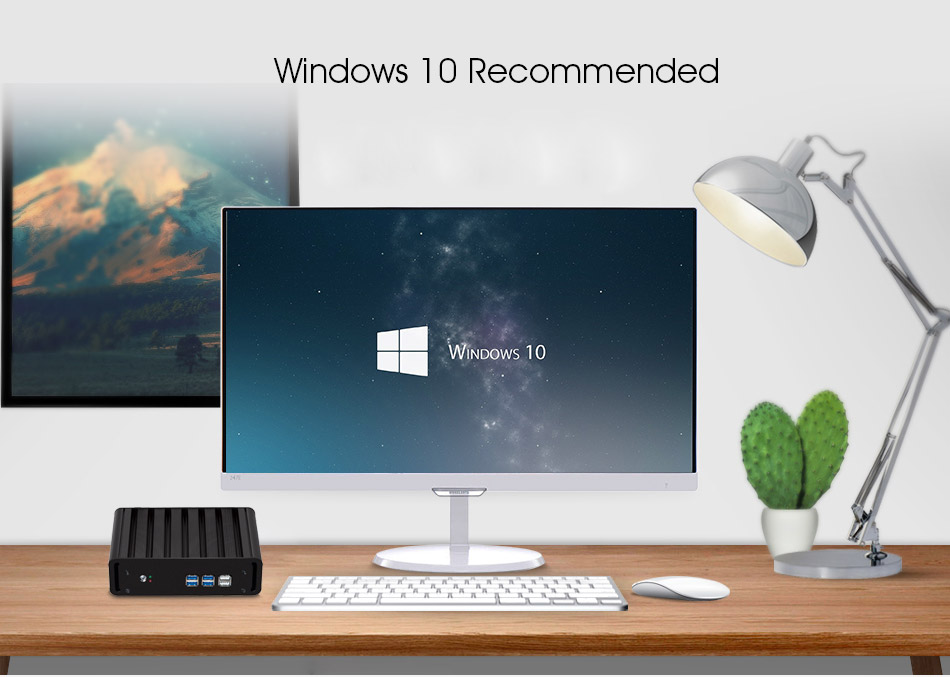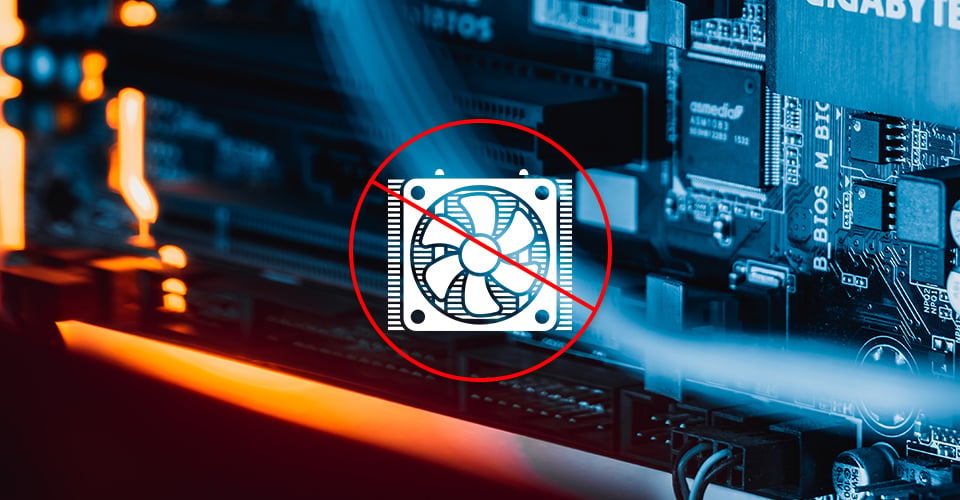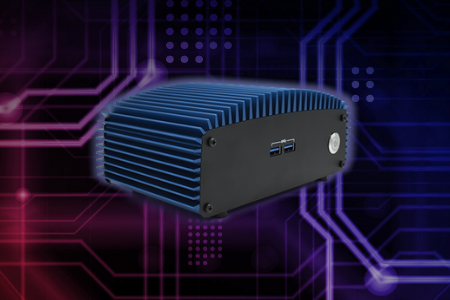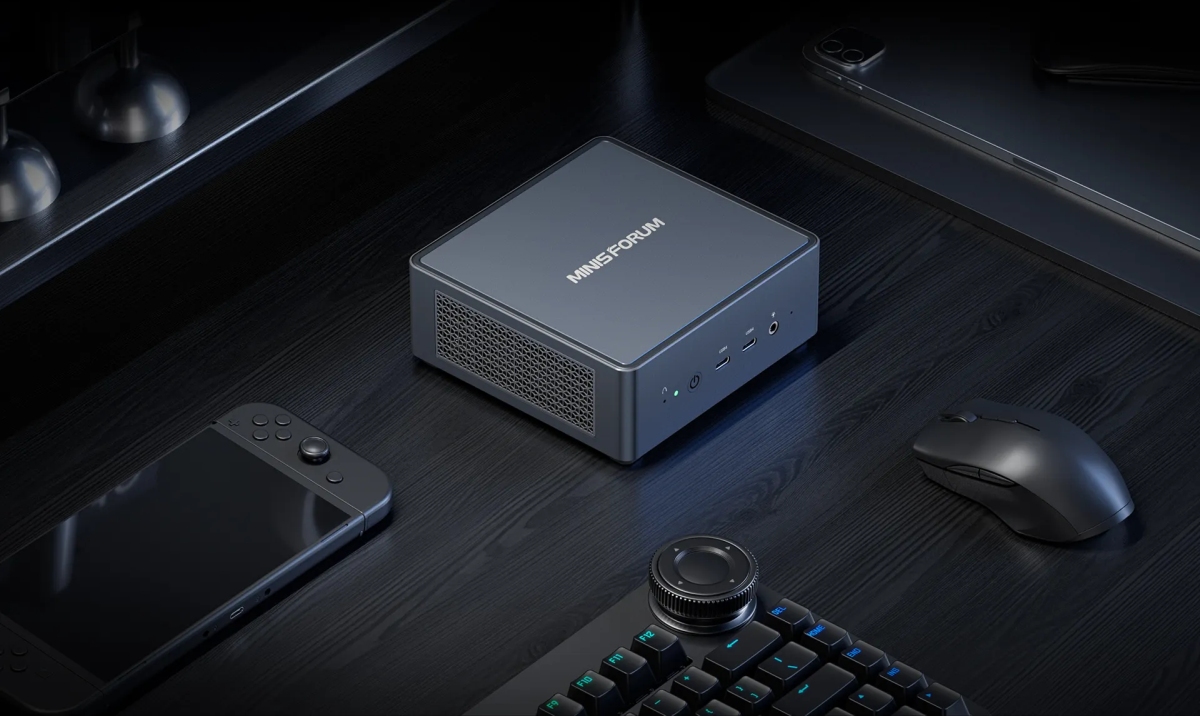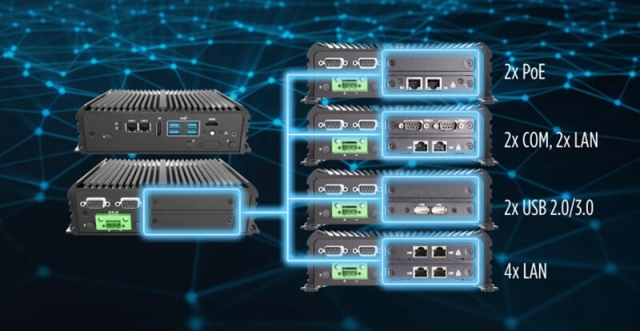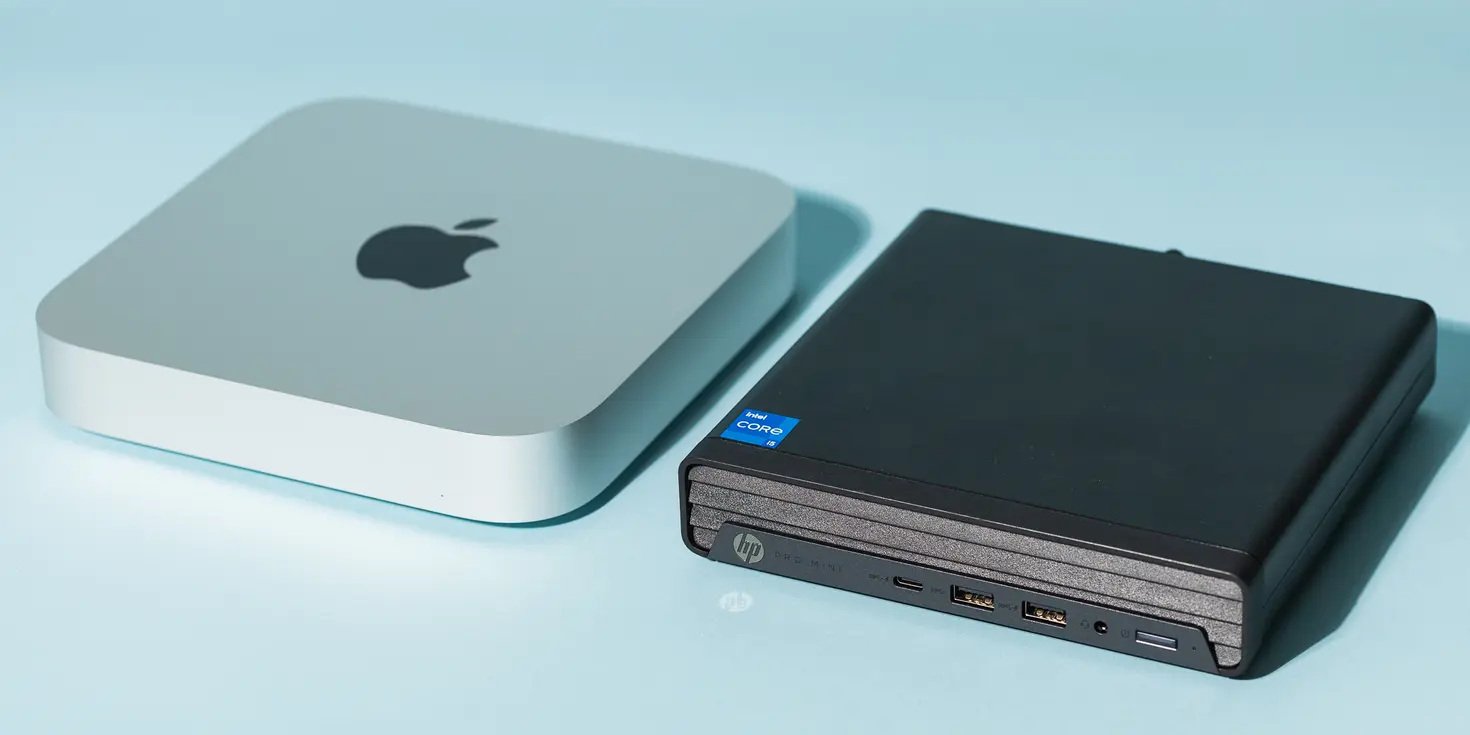What Is A Fanless Mini PC?
A fanless mini PC is a mini industrial computer that’s designed to tackle complex industrial workloads. Mini PCs are passively cooled via heatsinks and are designed with ruggedness in mind for deployment in various types of volatile environments. Fanless mini computers are great for IoT processing and edge level data telemetry of sensory workloads. Small form factors PCs offer great, versatile I/O ports that support both new and legacy technologies, all from a compact and small footprint solution.
Fanless mini-computers can perform a variety of mission-critical industrial applications that include smart vending, interactive kiosk machines, security, surveillance, digital signage, and industrial automation. That said, not all fanless mini PCs are created equal.
For example, if you need a small fanless computer to power a small kiosk machine, you can choose an option such as the BCO-1000 Series, which comes equipped with the Intel® Celeron® Quad Core J1900 Processor. However, if you have more compute-intensive tasks, you should consider one of our more powerful fanless mini PCs, such as the RCO-3600 Series.
Regardless of whether you’re looking for a low-powered or a powerful fanless mini PC, Elpro Technologies has your covered with a wide variety of fanless mini-computers you can choose from.
What Are The Benefits Of Fanless Mini Computers?
There are several benefits for deploying fanless mini PCs; here are the most important advantages such systems offer:
1. Dust & Debris Resistance
One of the main benefits of deploying a fanless mini PC is that they are resistant to dust and debris thanks to their fanless design. By implementing a fanless design, our engineers were able to eliminate the need for any openings or vents. This results in a totally enclosed system that is resistant to dust and debris. This is so because there is no need for fans to circulate air to cool the system. Instead, the internal components are cooled via the use of heatsinks. Heatsinks transfer the heat away from internal heat-generating components to the system’s outer enclosure, which acts as a massive heatsink, dissipating the heat into the surrounding air. As more and more IoT sensors come online, new edge workloads are shifting into remote, mobile, and outdoor environments where 24/7 operations is key for longevity.
2. Shock & Vibration Resistance
The second advantage of fanless mini computers is that they are resistant to shocks and vibrations, something that regular desktop PCs cannot handle. Additionally, the most ruggedized industrial fanless computers even adhere to the testing guidelines for military specifications (MIL-SPEC-810G), which ensure up to 50Gs shock and 5GRMs vibrations.
Fanless mini PCs are designed and built to withstand frequent exposure to shocks and vibration by employing a single-piece design that eliminates the needs for cables and reduces the number of joints and screws the system requires. The less moving parts that are used in the system, the fewer things that can fail, resulting in a more reliable and robust fanless computing solution.
Additionally, rugged fanless PCs have a thicker beefed-up motherboard that’s less prone to flexing or bending, thus creating a more reliable rugged mini PC that can handle frequent exposure to shocks and vibrations.
Furthermore, we have utilized a cableless design that eliminates cables entirely from the system, thus eliminating the possibility that a cable comes loose, allowing the system to better handle shocks and vibrations, thus creating a more reliable solution.
That said, fanless mini PCs can be equipped with SSDs, which add additional shock and vibration resistance to the system. This is so because solid-state drives (SSDs) store data on silicon chips vs. the spinning platters that traditional hard drives use. As such, SSDs are more reliable than regular HDDs, thus creating a solution that is more reliable than regular desktop PCs.
3. Wide Temperature Range
Fanless mini PCs are able to operate in a variety of different harsh and volatile environments because they were engineered and built with ruggedness in mind. Fanless mini-computers are able to withstand a wide temperature range that ranges from -40⁰C to 85⁰C. So, whether you’re deploying a rugged mini computer in digital signage in Sweden where the winter temperature reaches -40⁰C or you’re deploying it in an oil field somewhere in the desert where the temperatures can reach 50⁰C, rugged mini PCs will be able to perform reliably while providing you with optimal performance.
4. Silent Operation
The fourth benefit of deploying small fanless PCs is their ability to operate silently. Silent operation is possible thanks to the elimination of fans from the system. Fans are the components that create the most noise in a PC. As such, by eliminating them, you are left with a silent operating PC. Small silent PCs are great for deployment in environments where silence is required. This includes settings such as operating rooms, libraries, vehicles, and other places where silence is required.
5. Better Durability & Reliability
The fifth advantage of fanless mini computers is that they are made from industrial components that are more durable and reliable than the components used in consumer-grade desktop computers. This is so because the components used in industrial PCs are tested and validated to be able to operate under the most volatile conditions.
Additionally, the removal of fans makes industrial mini PCs more reliable because it eliminates the possibility that dust and debris can enter into the system damaging sensitive internal components.
Additionally, fanless mini PCs are durable because they utilize SSDs, which are more durable than regular HDDs, which store data on spinning platters. HDDs have a mean time between failures of 300,000 hrs, whereas SSDs have a mean time between failures of 1.5 million hrs, making them 5x more reliable than traditional hard drives.
6. Small Footprint
Mini fanless PCs have a small footprint, which allows them to be deployed on their own or close to other mini PCs. This is possible thanks to the fanless design of the systems that cools them down without the need to circulate air to cool them down. Therefore, if you need a small industrial PC that can fit into small cabinets, underneath tables, can be mounted on walls or ceiling in tight spaces, small industrial computer systems are the ideal option. For example, the BCO-1000 Series come in at 142MM (W) x 101MM (D) x 30MM (H), and the RCO-1000 Series, which comes in at 150MM (W) x 105 (D) x 37MM (H). Both options are compact enough to fit in the palm of your hand.
7. Low Power Consumption
An added benefit of deploying fanless mini PCs is that they consume less power than regular desktop computers. Industrial mini computers consume less power because they are equipped with low powered CPUs, which are passively cooled and therefore consume less power and output less heat. The lower power consumption translates into less energy being consumed, thus reducing the energy cost associated with deploying such computing solutions. Although the money saved by deploying one mini pc is negligible, you will save a significant amount of money on energy costs if you are deploying hundreds or thousands of these devices.
8. Wide Input Voltage, Power Surge Protection, And Reverse Polarity Protection
Elpro’s fanless PCs are designed with a wide input voltage that ranges from (9 to 50VDC) for compatibility with many variations in power input scenarios.
Additionally, mini PCs come equipped with overvoltage protection, which allows the power supply to cut off the power whenever the voltages exceeds a specified level to protect the sensitive internal components.
Additionally, the best designs for fanless computing solutions come equipped with a power surge protection feature, which detects power surges if the voltage rises above an acceptable level, diverting the electricity into the ground to avoid damage to the internal components.
Reverse polarity protection ensures that the mini computing solution is not damaged in the event that power supply polarity is reversed. If the reverse polarity detection system detects that polarity has been reversed, it will cut off the power to the internal components to prevent them from being damaged.
These special power protection features are specific to industrial-grade computing solutions demanding reliability in mission critical enterprise deployments.
9. Support For Wireless Connectivity
Fanless mini computers can be configured to include Wi-Fi 6, Bluetooth, 4G, LTE, and 5G. Wi-Fi provides fanless mini computers with low-latency high-speed connectivity. Additionally, Wi-Fi has great range, rich features, and an exhaustive level of deployment control that allow you to configure the settings according to your specific requirements.
If Wi-Fi connectivity is not present, your fanless pc system can stay connected to the internet since they are equipped with sim modules that enable cellular connectivity, including 4G, LTE, and 5G, all of which deliver high speed communications for data telemetry, and IoT applications.
In addition to Wi-Fi and Cellular connectivity fanless mini PCs come equipped with Bluetooth, which offers quick and simple connectivity for low-powered devices, allowing IoT devices to seamlessly connect with your edge computing device while maintaining power efficiency. That said, Bluetooth does not offer the speed and range that cellular and Wi-Fi connectivity offer, but it does provide reliable one-to-one or many to many connectivity.
What Are The Different Types Of Fanless Mini Computers?
There are two main types of fanless mini computers: industrial fanless mini computers and rugged fanless mini PCs. Fanless mini-computers are industrial-grade computers that can be deployed in volatile environments that are unfriendly to regular desktop computers. However, rugged edge mini computers take it a step further, adding ruggedness to the devices, enabling them to be deployed in environments that experience extreme cold and hot temperatures.
For example, regular fanless mini PCs can be deployed in environments where the temperature ranges from -20⁰C to 50⁰C, whereas rugged fanless PCs can be deployed in environments where the temperature ranges from -40⁰C to 85⁰C, thus making them better able to handle extremely cold and extremely hot environments.
Both of our rugged fanless PCs and regular mini fanless PCs can be deployed in environments that are exposed to dust, debris, shocks, and vibrations. In fact, both rugged fanless mini PCs and regular fanless mini PCs are able to withstand being exposed to dust and debris thanks to the fanless design that eliminates the need to have vents, which prevents debris and dust from making their way into the system to damage sensitive internal components. Additionally, both solutions are resistant to shock, validated to withstand up to 50Gs of shock and 5 GRMs of vibration.
Elpro’s Line Of Fanless Mini PCs
Elpro Technologies offers two main Series of Mini fanless computers that you can buy; these are the BCO Series of Fanless Mini Computers and the RCO Series of Rugged Fanless Mini Computers, we will discuss them in more detail below.
BCO-1000 Series Of Fanless Mini Computers
The BCO-1000 Series of Fanless PCs is designed for fundamental tasks and entry-level applications. The BCO Series is cost-competitive while offering modest performance. The key feature of the BCO series is the compact size of the computing system, which allows it to fit in a variety of small, space-constrained environments. Additionally, it’s equipped with rich I/O capabilities that enable the system to integrate with new and legacy technologies alike.
The BCO-1000 Series of fanless computers is powered by the time-tested Intel® Celeron® Quad Core J1900 Processor, offering modest performance while maintaining power efficiency. The J1900 has four cores with a 2.0 GHz clock speed and a TDP rating of 10 Watts, making it one of the best solutions for compact embedded computing.
Additionally, the BCO-1000 series comes equipped with rich I/O features that include USB, COM, Gigabit Lan, DVI-I, and digital I/O ports, enabling a wide variety of industrial applications.
Additionally, the BCO-1000 series is tested and validated for extreme environments, having a wide temperature range of -20⁰C (-4⁰F) to 50⁰C (122⁰F). Explore all of the options that the BCO series of fanless mini computers has to offer. If you need any help selecting a fanless PC that meets your specific requirement, please do not hesitate to contact us. One of our fanless pc professionals will assist you in finding the right computing solution.
BCO-2000 Series Of Fanless Mini Computers
The BCO-2000 fanless mini computer offers powerful processing performance with Intel’s 8th Generation Mobile-U Core® i5, i3, and Intel® Celeron® Processors in a palm-sized, compact form factor. The single board computer packs impressive system-on-chip (SoC) performance, low TDP, and I/O port variety that can be integrated into a rugged system-level design. Its small form factor is ideal for processing industrial-focused workloads in space-constrained environments.
The BCO-2000 differentiates itself in the industrial computing market by addressing options for more I/O ports, rather than a fixed port design. The BCO-2000 fanless computers solves the limitation in I/O ports by offering modular kits to meet an variety of IoT requirements. System integrators and IoT deployment projects can configure I/O ports to match their device requirements.
In addition to its modular flexibility the BCO-2000 fanless mini computer is also tested and validated for industrial environments for wide-temperature (-20C to 60C), shock (20G) and vibrations (3GRMS).
RCO-1000 Series Of Fanless Mini Computers
The RCO Series of Fanless PCs is designed for entry-level and advanced applications in compact and harsh environments that are unfriendly to regular desktop computers. The RCO Series offer modest performance while providing ultra-low power consumption, all in a compact package that can be deployed in space-constrained environments.
The RCO 1000 Series come in four different form factors, offering support for multiple I/O configurations. The RCO-1000 Series is ideal for embedded applications, such as machine automation, interactive kiosks, IoT Gateways, and digital signage.
The RCO-1000 Rugged Series of Fanless Mini Computers is capable of operating a wide temperature range that ranges between -25⁰C and 70⁰C, so whether you’re deploying this computing solution in an oil field in the middle of a desert or in digital signage in the middle of Sweden during the winter, the RCO series of rugged mini-computers will perform reliably.
Additionally, the RCO series of fanless industrial computers can operate in environments exposed to frequent shocks, vibrations, dust, and debris thanks to the mechanical engineering that went into designing and building these devices.
RCO-3000 Series Of Rugged Fanless Mini PCs
The RCO-3000 Series of fanless mini PCs offer a balance between performance and power. The 3000 Series come in three different form factor to accommodate the different I/O configurations and expansion options. Overall, the RCO-3000 Series is great for someone who is looking for an industrial computing solution that offers performance, power, and I/O expansion capabilities.
Additionally, the RCO-3000 Series is capable of surviving in the most volatile environments that to its wide temperature range of -40⁰C to 70⁰C.
The RCO-3000 Series can be configured either with Intel® Celeron® Processors or the more powerful Intel® Broadwell-U® Core® i3 and i5 processors. The processor you need will vary depending on the applications you want your fanless mini computer to run.
For example, the Intel Celeron J1900 offers modest performance and excellent energy efficiency, making it great in deployment for interactive kiosks, IoT gateways, data telemetry, and digital signage.
On the other hand, equipping a system with the more powerful Intel® Core® i3 and i5 makes the system more powerful, making it great for tasks such as security, surveillance, industrial manufacturing, factory automation, and other applications that require real-time data analytics.
In the event that you require additional connectivity, Elpro provides ethernet daughterboard module that seamlessly integrate into Elpro’s fanless Mini PCs through standard PCIe protocols. Adding a daughterboard can increase ethernet I/O ports up to six ports for IoT deployments that require ethernet connections in multiple RJ45 and M12 locking connectors. Both RJ45 and M12 locking connectors can provide PoE+ (IEEE 802.3at) for data and power through a single cable.
RCO-3400 Series Fanless Mini PCs
The RCO-3400 Series of Fanless Mini PCs is a powerful option that comes equipped for Intel 7th Generation Core i3 and i5 Mobile-U Processors. Not only is this Series powerful, but it was designed and built with ruggedness in mind. The RCO-3400 Series is ideal for transportation technologies needing high performance, such as remote fleet management, all from a compact form factor.
The RCO-3400 Series can be configured with either an Intel Core i3-7100-U or an Intel Core i5-7300U to support a wide range of edge computing and industrial IoT use cases while offering robust performance and connectivity.
Additionally, the RCO-3400 series can operate in a wide variety of harsh environments thanks to the rugged engineering and built quality that allows the min fanless computing solution withstand frequent exposure to shocks, vibrations, dust, and debris.
If you require additional connectivity, Elpro Technologies ethernet daughterboard modules can be added through standard PCIe protocols. Adding a daughterboard increases the total ethernet I/P ports up to eight ports for IoT deployments that require ethernet connections in multiple RJ45 and M12 locking connectors. Both RJ45 and M12 locking connectors are able to provide PoE+ (IEEE 802.3at) for data and power through a single cable.
RCO-3600 Series Fanless Mini Computer
The RCO-3600 Series of Fanless Mini Computers is a powerful option that can be configured with 6th/7th Generation Intel Core i3, i5, and i7 or Intel Celeron Processors. The RCO-3600 Series can be deployed in volatile environments where commercial desktop computers cannot be deployed. Rugged fanless mini PCs can withstand deployment in dirty, dust-filled environments thanks to the fanless and ventless design.
The RCO-3600 utilizes an LGA 1151 socket that permits the mini computer system to be configured for high performance, having a TDP of 35 watts. Additionally, the RCO 3600 comes configured with 8 USB Ports, 6 of which are externally located, with the remaining two internally located. USB ports permit the user to connect modern technologies, such as high resolution cameras and other input devices.
Additionally, USB ports allot for intelligent power management and high-speed data transfer for connected IoT devices, something that cannot be done with legacy serial ports.
The RCO-3600 Series is well equipped to run AI applications at the edge, enabling users to capture, store, and process large amounts of data in real-time near the source of data generation.
For example, if you want to perform camera inspection of products or components, you can utilize mini edge computers to perform such processing close to the factory floor.
Additionally, deploying a mini edge PC on the factory floor helps you avoid the latency associated with transferring data over long distances to data center for processing and analysis.
That said, if you require help configuring your RCO-3600 Series, please contact us, and one of rugged edge fanless computing professionals will assist you.

